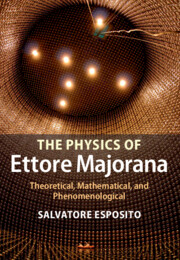Book contents
- Frontmatter
- Contents
- Acknowledgments
- Part I Introducing the character
- Part II Atomic physics
- Part III Nuclear and statistical physics
- Part IV Relativistic fields and group theory
- Part V Quantum field theory
- 9 Scalar electrodynamics
- 10 Photons and electrons
- Part VI Fundamental theories and other topics
- Part VII Beyond Majorana
- Appendix Molecular bonding in quantum mechanics
- References
- Author index
- Subject index
9 - Scalar electrodynamics
Published online by Cambridge University Press: 18 December 2014
- Frontmatter
- Contents
- Acknowledgments
- Part I Introducing the character
- Part II Atomic physics
- Part III Nuclear and statistical physics
- Part IV Relativistic fields and group theory
- Part V Quantum field theory
- 9 Scalar electrodynamics
- 10 Photons and electrons
- Part VI Fundamental theories and other topics
- Part VII Beyond Majorana
- Appendix Molecular bonding in quantum mechanics
- References
- Author index
- Subject index
Summary
Sponsored by the Royal Academy of Italy, in October 1931 Enrico Fermi and Orso Mario Corbino organized the first fully international conference devoted to nuclear physics in Rome. In addition to renowned scientists as Bohr, Heisenberg, Pauli, and many others [298], three young physicists participated in that congress: Wick, Heitler, and Majorana. A particular episode happened during one lunch time at the conference that caught the attention of Wick:
I was asked by Heitler to act as a sort of interpreter between him and Majorana. He spoke hardly any Italian, and Majorana's German was a bit weak. So during lunches, Heitler expressed a curiosity in what Majorana was doing; Fermi must have told him how bright he was. So Majorana began telling, in that detached and somewhat ironical tone, which was typical of him, especially when discussing his own work, that he was developing a relativistic theory for charged particles. It was not true, he said, that the Schrödinger equation for a relativistic particle had to have the form indicated by Dirac. It was clear by now, that in a relativistic theory one had to start from a field theory and for this purpose the Klein–Gordon wave-equation was just as legitimate as Dirac's. If one took that, and quantized it, one got a theory with consequences quite similar to Dirac positron theory, with positive and negative charges, the possibility of pair creation etc. You can see what I am driving at: Majorana had the Pauli–Weisskopf scheme all worked out already at that time. […] Heitler probably forgot all about it, and so did I, until I saw the paper by Pauli and Weisskopf.
I must confess that I knew enough to understand the gist of what he was saying, but not enough to appreciate how novel and original it was. Heitler probably did, because his comment, as I recall it, was: “I hope you will publish this.” […] [But] in the case I have described publication never occurred. [299, 300]
Wick and Heitler probably provided the only testimonies of some results obtained by Majorana about one of his favorite topics, as widely recorded in his personal study notes [18]; namely, quantum electrodynamics.
- Type
- Chapter
- Information
- The Physics of Ettore MajoranaTheoretical, Mathematical, and Phenomenological, pp. 195 - 213Publisher: Cambridge University PressPrint publication year: 2014



